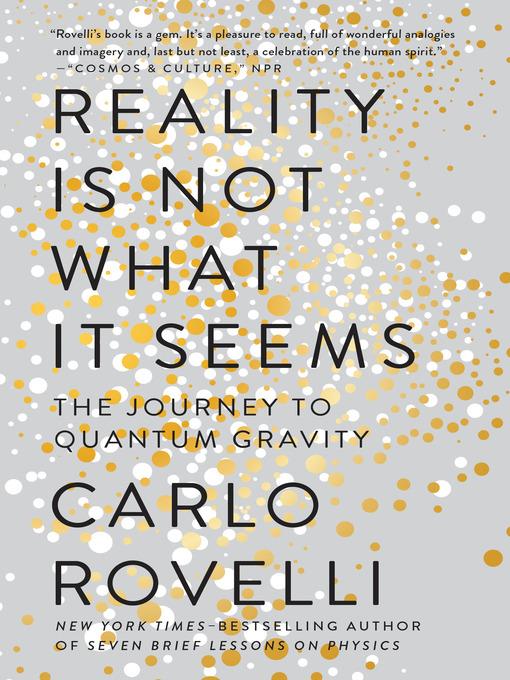
Reality Is Not What It Seems
The Journey to Quantum Gravity
کتاب های مرتبط
- اطلاعات
- نقد و بررسی
- دیدگاه کاربران
نقد و بررسی

November 14, 2016
In his latest explanatory work, Rovelli (Seven Brief Lessons on Physics), a theoretical physicist and proponent of loop quantum gravity, sets himself the difficult task of attempting to clarify for laypeople the most recent scientific theories about the nature of the universe. He begins with historical lessons, going back to philosophical questions posed in Western antiquity. Rovelli races forward through the work of Newton, Faraday, and Maxwell to get to how Einstein refined and added to the field theories of electromagnetism. One of the book’s strengths is the picture Rovelli develops of how scientists build on the work of others. But the bulk of the book focuses on evaluating the perplexing nature of space and time, which, as they are commonly understood, appear to be little more than convenient constructs. “Space is created by the interaction of individual quanta of gravity,” Rovelli writes, while “the world is made entirely made from quantum fields.” The difficulty of understanding this aside, Rovelli smoothly conveys the differences between belief and proof, and concludes with a lovely chapter on being ignorant and eager for the next discovery. Rovelli’s work is challenging, but his excitement is contagious and he delights in the possibilities of human understanding.

November 1, 2016
When theoretical physicist Rovelli's Seven Lessons in Physics became an international bestseller in 2015, his Italian publisher proceeded to translate this, his previous book, which turns out to be an admirable addition to a popular genre: explaining what scientists know about the universe and their struggles to learn more.Most authors in this subject begin with the Greeks and make their ways through Newton, Galileo, and Maxwell to the glories of Einstein's relativity and the founders of quantum mechanics. In good hands, this is a smooth ride, and Rovelli--the head of the Quantum Gravity group at Aix-Marseille University and one of the founders of the loop quantum gravity theory--is good. Then the story gets tougher. Relativity and quantum mechanics are incompatible, and physicists today are trying to combine them to produce a single, satisfying theory of everything. This requires complex ideas that dissect everything, space-time included, to a very, very tiny state where their quintessence emerges. Rovelli delivers a respectful nod to string theory, but he belongs to the rival school of quantum loop gravity, the central feature of which is that space itself is quantized. "The central prediction of loop theory is...that space is not a continuum," writes the author, "it is not divisible ad infinitum, it is formed of 'atoms of space, ' a billion billion times smaller than the smallest of atomic nuclei." Got it? For some readers, the narrative will be a slog. Science buffs will admire Rovelli's lucid writing, but at some point, many will realize that they no longer understand. Cutting-edge theoretical physics for a popular audience that obeys the rules (little math, plenty of drawings), but it's not for the faint of heart.
COPYRIGHT(2016) Kirkus Reviews, ALL RIGHTS RESERVED.

























دیدگاه کاربران